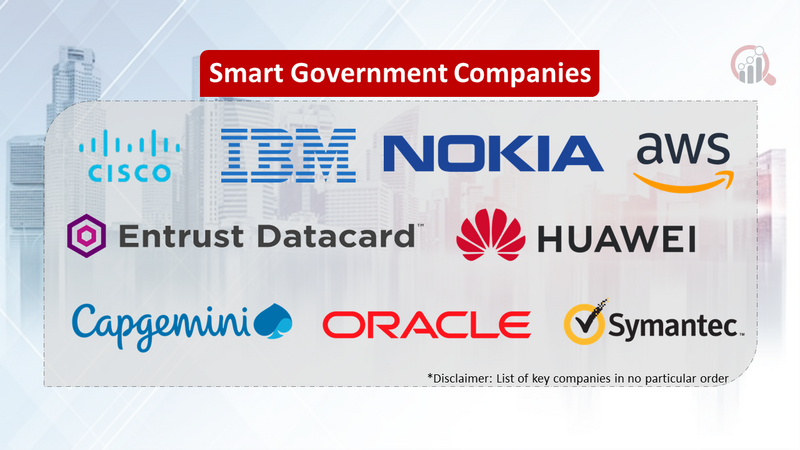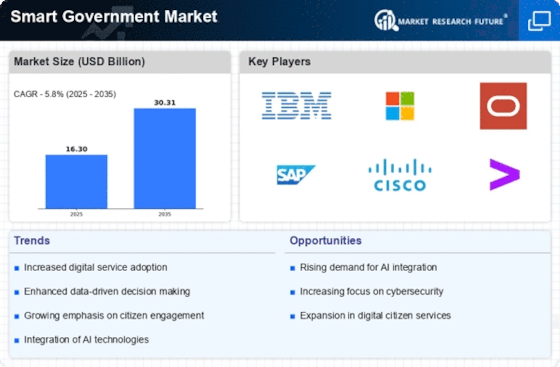Top Industry Leaders in the Smart Government Market

Competitive Landscape of the Smart Government Market:
The smart government market, encompassing technology and services that enhance efficiency and citizen engagement, is experiencing a vigorous surge, driven by rapid technological advancements and increasing public demand for improved government services. This highly dynamic landscape boasts a diverse array of players, each vying for a slice of the burgeoning market share.
Key Players:
- Cisco Systems, Inc. (U.S.),
- IBM Corporation (U.S.),
- Amazon Web Services, Inc. (U.S.),
- Entrust Datacard Corporation (U.S.),
- Imex Systems Inc. (Canada),
- Nokia Corporation (Finland),
- Huawei Technologies Co.,
- Capgemini SE (France),
- Oracle Corporation (U.S.)
- Symantec Corporation (U.S.)
Factors for Market Share Analysis:
- Breadth of Portfolio: Companies with a comprehensive suite of solutions across various smart government domains, including e-governance, citizen services, public safety, and smart city infrastructure, are better positioned to capture market share.
- Technological Innovation: Players that continuously invest in cutting-edge technologies like AI, IoT, and blockchain can gain a competitive edge by offering advanced solutions that improve efficiency and citizen satisfaction.
- Data Security and Privacy: Concerns surrounding data security and privacy are paramount in the smart government realm. Companies with robust data governance practices and adherence to privacy regulations are more likely to secure contracts with governments.
- Local Expertise and Partnerships: Understanding the local context and forging strong partnerships with government agencies and private stakeholders are crucial for success in specific regions.
- Pricing and Cost-Effectiveness: Governments are increasingly budget-conscious, so players offering cost-effective solutions and demonstrating a clear return on investment (ROI) are more likely to gain traction.
New and Emerging Companies:
The smart government market is constantly evolving, with new players emerging at a rapid pace. Startups like ZenCity, Agora, and Civocracy are disrupting the landscape by offering innovative solutions in citizen engagement, data analysis, and open-source platforms. These companies are capturing the attention of governments looking for agile and cost-effective solutions.
Current Investment Trends:
- Cloud Adoption: Governments are increasingly shifting towards cloud-based solutions for their smart government initiatives due to scalability, flexibility, and cost efficiency. Cloud providers like AWS and Microsoft Azure are experiencing significant growth in this segment.
- Cybersecurity: As data collection and analysis become more prevalent, concerns over data security and privacy are driving investments in cybersecurity solutions. Companies specializing in data security and encryption are witnessing increased demand.
- Artificial Intelligence (AI): AI-powered solutions for data analysis, automated decision-making, and predictive maintenance are gaining traction, attracting significant investments from both established players and startups.
- Internet of Things (IoT): The growing network of connected sensors and devices in smart cities is opening up new opportunities for IoT-based solutions in areas like traffic management, waste management, and energy efficiency. Companies specializing in IoT infrastructure and applications are experiencing considerable growth.
Latest Company Updates:
Oct 2023, Governments are increasingly turning to cloud technology for data storage and processing, fueling market growth.
Sept 2023, Data security and privacy remain major concerns as governments embrace smart technologies.










